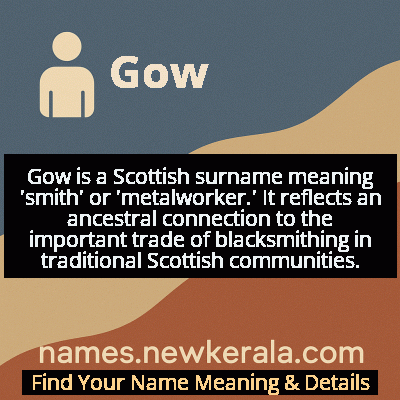Gow Name Meaning & Details
Origin, Popularity, Numerology Analysis & Name Meaning of Gow
Discover the origin, meaning, and cultural significance of the name GOW. Delve into its historical roots and explore the lasting impact it has had on communities and traditions.
Name
Gow
Gender
Male
Origin
Scottish
Lucky Number
9
Meaning of the Name - Gow
Gow is a Scottish surname meaning 'smith' or 'metalworker.' It reflects an ancestral connection to the important trade of blacksmithing in traditional Scottish communities.
Gow - Complete Numerology Analysis
Your Numerology Number
Based on Pythagorean Numerology System
Ruling Planet
Mars
Positive Nature
Generous, passionate, energetic, and humanitarian.
Negative Traits
Impulsive, impatient, moody, and can be overly emotional.
Lucky Colours
Red, maroon, scarlet.
Lucky Days
Tuesday.
Lucky Stones
Red coral, garnet.
Harmony Numbers
1, 2, 3, 6.
Best Suited Professions
Military, sports, philanthropy, leadership roles.
What People Like About You
Courage, energy, leadership, generosity.
Famous People Named Gow
John Gow
Pirate
Led one of the last major pirate operations in British waters during the early 18th century
Neil Gow
Musician
Revolutionized Scottish fiddle music and composed many traditional tunes still played today
Ninian Gow
Artist
Documented Highland life through portraiture and landscape painting in the Victorian era
James Gow
Scholar
Significant contributions to classical education and scholarship in late 19th century Britain
Name Variations & International Equivalents
Click on blue names to explore their detailed meanings. Gray names with will be available soon.
Cultural & Historical Significance
Historically, Gow families were often associated with specific regions where they practiced their trade for generations, creating local dynasties of craftsmen. The name appears in various historical records, from tax rolls to clan documents, indicating its widespread distribution across Scotland. During the Highland Clearances and subsequent Scottish diaspora, many Gow families emigrated, carrying their name and skills to new lands. This migration helped spread Scottish metalworking traditions worldwide while maintaining the cultural identity associated with the name. The Gow surname thus represents not just an occupation but a living connection to Scotland's industrial heritage and the skilled trades that built communities.
Extended Personality Analysis
Those bearing the name Gow often exhibit characteristics that reflect their ancestral connection to the smithing tradition—practical intelligence, physical strength, and a methodical approach to problem-solving. There's typically a strong work ethic and dedication to craftsmanship, whether in traditional trades or modern professions. The historical smith needed patience, precision, and the ability to work with intense focus, traits that may manifest in modern Gows as attention to detail and perseverance through challenging tasks.
Beyond the practical, there's often a creative dimension to the Gow personality, as the original smiths were artists who transformed raw materials into both functional and beautiful objects. This can translate into innovative thinking and the ability to see potential where others see only raw materials. Gows are frequently described as reliable and grounded individuals, the type of people others turn to in difficult situations. There's also often a strong sense of tradition and family heritage, with many taking pride in their Scottish roots and the historical significance of their name. The combination of practical skill and creative vision makes for individuals who can both dream and build, envision and execute.
Modern Usage & Popularity
In contemporary society, Gow remains predominantly a surname rather than a given name, though it occasionally appears as a first name in families wishing to honor their Scottish heritage. The name maintains its strongest presence in Scotland and among Scottish diaspora communities, particularly in North America and Australasia. While not among the most common Scottish surnames, it has stable usage and recognition, often associated with families who have maintained their Scottish identity across generations. In recent decades, there's been growing interest in unique and heritage names, which has led to occasional use of Gow as a first name, though it remains relatively uncommon in this role. The name continues to appear in various professional fields, with many modern Gows working in engineering, trades, arts, and education—fields that in different ways echo the original smith's combination of technical skill and creativity.
Symbolic & Spiritual Meanings
The name Gow carries rich symbolic meaning rooted in the ancient archetype of the smith as creator and transformer. Symbolically, it represents the power to shape raw potential into refined reality, to endure intense pressure and emerge stronger—much like metal in the forge. The smith's tools each carry their own symbolism: the hammer represents action and impact, the anvil signifies stability and foundation, and the fire embodies both destructive and creative power. Together, they create a powerful metaphor for personal growth through challenge and transformation.
This symbolism extends to concepts of resilience and adaptability, as the smith must constantly adjust techniques to different materials and desired outcomes. The name also carries connotations of value creation—turning common materials into precious objects—and community service, as the smith's work supported entire villages. In a broader sense, Gow symbolizes the human capacity to shape our environment and destiny through skill, perseverance, and vision. It represents the bridge between imagination and manifestation, between raw potential and finished creation.

